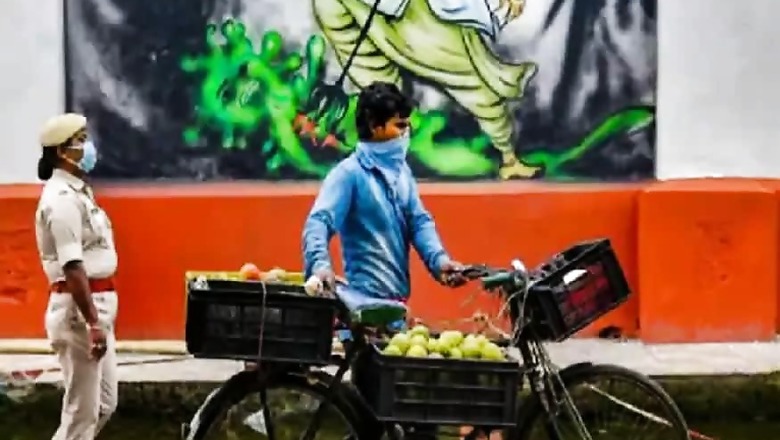
views
The nation is abuzz with Prime Minister Narendra Modi’s ‘Atmanirbhar Bharat’ campaign. What is a better example of self-reliance than our street vendors who show up unerringly every morning to supply us with daily essentials?
In an effort to extend this campaign to street vendors, the Ministry of Housing and Urban Affairs has announced the SVANidhi Scheme that offers Rs 10,000 as credit for working capital to each vendor.
Though it is hard to argue with the intention of the scheme, it is important to think through how such a scheme might play out, anticipate the obstacles to success, and begin thinking of them as entrepreneurs not nuisance.
One of the first problems would be availing this credit facility for which a person would need to prove that he/she is a street vendor.
According to data available with the National Urban Livelihoods Mission, state governments have identified only 15 lakh vendors and issued IDs to fewer than 10 lakh vendors.
Over 1,000 urban local bodies (ULBs) across India have not even begun identifying vendors via surveys. Andhra Pradesh is the only state to have issued identity cards to 75% of identified vendors. Even where local bodies have completed surveys, they have identified far fewer vendors than the estimated vending population.
The Street Vendors Act 2014 estimates that approximately 2.5% of the urban population is engaged in street vending. In most states, the number of vendors identified make up less than 1% of the urban population.
For those left out of the survey, the scheme contemplates a letter of recommendation (LoR) issued by the urban local body or the town vending committee. However, the criteria for issuing these LoRs are muddled.
For instance, ULBs may issue LoRs based on a list of vendors prepared by states. The basis that states would use for preparing these lists is unclear, as is the logical chain of asking states to prepare these lists and forward it to local bodies. How will the government check that this is not used to unduly benefit friends and associates of decision-makers?
Further, the scheme has only been extended to vendors engaged in vending before 24 March, 2020. In the past two months, several wage labourers have switched to vending to earn a living.
Manoj Kumar of the National Hawkers Federation claims that the number of vendors in Delhi alone has gone up by 1 lakh. What happens to these new entrants?
The second problem is state-level regulations that actively prevent vendor recognition, obstruct their formalisation and encourage harassment.
Some states, in their rules and schemes, discriminate against ‘migrants’ and fail to recognise them as vendors. For instance, in Delhi, Mumbai and Tripura, one needs proof of domicile or a voter ID to become a hawker. In Andhra Pradesh, non-residents are not issued IDs and vending certificates.
At Centre for Civil Society, we analysed the state-level rules and schemes born out of the Street Vendors Act. Besides excluding vendors based on ill-conceived son-of-the-soil criteria, states have also introduced several arbitrary and vague provisions.
For instance, in Bihar, Meghalaya and Rajasthan, hawkers need to keep a 'service record book' for Municipal ‘babus’ to inspect and decide whether to reward or punish a hawker.
In Chhattisgarh, Manipur and Bihar, schemes allow for suspension/ cancellation of licence on grounds of ‘misbehaviour’. In Meghalaya, Tripura, and West Bengal, schemes essentially ban roadside cooking.
Tripura also forbids electricity and water connection to vendors in its schemes. Such regulations create a hostile environment for vendors, penalising them for trying to earn an honest livelihood.
Another concern is that while most business enterprises have been issued guidelines on functioning, vendors are not being allowed to operate or being given a clear set of directions.
How will vendors get back on their feet or repay the loans if they are not allowed in the markets? Most states have tried to think about de-lockdown systematically, but missed out on the most ubiquitous of urban entrepreneurs.
The credit package will raise many implementation challenges, and in itself, is far from sufficient. The Union and state governments need to do far better.
First, the Street Vendors Act needs to demand stricter accountability from public officials. The Act places very little emphasis on public officials actively protecting the rights of vendors, and imposes no penalties where they indulge in undue harassment.
Second, artificial entry barriers for vendors (particularly the son-of-soil requirements) need to be removed. State governments ought to do away with bottlenecks to earning a livelihood on the street by amending their state rules and schemes.
Third, formalising vendors will also require formalising their usufructuary rights or temporary user rights over vending spots. This will facilitate time-sharing of vending spots. We also need to allow vendors to manage multiple vending spots and employ labour.
Fourth, governments should allow private contractors to manage public spaces. This is likely to reduce bribery and bump up revenues for municipal corporations.
Companies can also be encouraged to invest in hawking carts (ice cream carts, for instance). To encourage such investment, we need a predictable, secure and non-extortionary regulatory framework.
Fifth, both the Centre and State must check rampant vendor evictions. Since evictions are driven by considerations for ‘public purpose’, states need to define it clearly in their schemes. The definition must be drafted with a view that thriving urban street commerce is as much public purpose as anything else.
Vendors may need temporary support, but more than that, they are begging the state to clear way for their 'atmanirbharta' (self reliance). Truth be told: making vendors’ lives easier will make all of our lives easier.



















Comments
0 comment